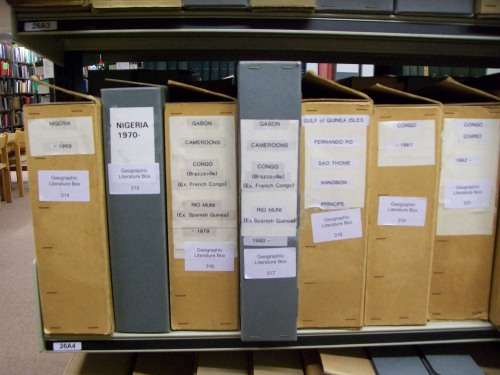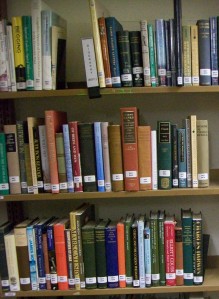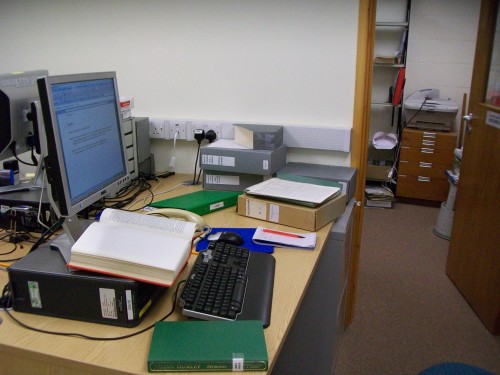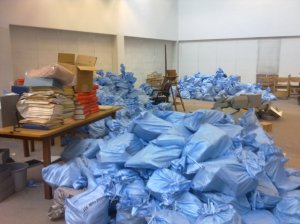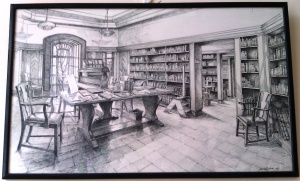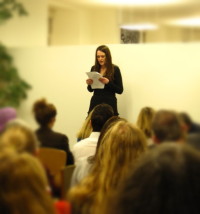This is the second of five blog posts written for round 8 of the Library Day in the Life Project by the graduate trainee at the Radcliffe Science Library.
9.15am: Usually on Tuesdays I would spend the whole day at the Alexander Library of Ornithology, but this week my Tuesday starts with an All Libraries Meeting. Once a term the Bodley’s Librarian gives a talk to staff of the Bodleian Libraries updating us all on what is happening in libraries around Oxford. Tea and coffee is provided before the meeting and I get a chance to meet a couple of people I’ve not met before. The meeting starts with fancy fly-through presentation of the plans for the new Weston Library (due to open in 2014); goes on to cover various digitization projects, most of which I’ve not heard about before; then there’s an update on the Bodleian Libraries website development project; the proposed plans for moving the History Faculty Library to the central Bodleian site are discussed; and it finishes with a question and answer session.
One digitization project which particularly caught my attention was a project called What’s the score at the Bodleian? The project aims to make available a collection of uncatalogued music scores from the 19th century. The difference with this project is that once items have been digitized and made available online with basic descriptive metadata, members of the public are being asked to help make the material more easily discoverable by adding more information about it. Does anyone know of any other projects using crowd-sourced creation of descriptive metadata?
11.15am: Arrive at the Alexander Library of Ornithology in the Zoology Department. Start up computer, greet colleagues, have a quick discussion about our thoughts on the All Libraries Meeting and check emails.
11.25am: My first task for today is carrying on with a something I started last Tuesday. The Alexander Library moved to its current home last summer and the listings for our geographical and subject reprints sequences still had the old shelf marks on them. I’m updating the lists, but I’m using the box numbers that were added to help with the move, rather than shelf marks so that if there is another move in the future it doesn’t have to be redone again. I’m starting today in the middle of the Africa part of the geographical sequence. I check that the box name on the list matches the box name on the box, write down the box number and when I’ve done that for a reasonable number of boxes go to the library office and fill in the table I’m making. The process is complicated by a lot of the countries having changed their names and boundaries over the years meaning there are a number of mismatches and some confusing labelling. I find Wikipedia very useful for demystifying these mismatches!
12.30pm: I get to the end of the Africa sequence and take a break from the reprints listings by flicking through the lastest copy of Outline – the Bodleian Libraries staff newsletter. An article about an exhibition at the Bodliean called The Romance of the Middle Ages catches my eye and I make a mental note to go and see it.
The librarian suggests I help her with a project to update the inventory of items in the rare books cupboard. The shelf marks need updating since they changed due to the move in the summer. We decide on the best way to go about the project and agree to start it next week.
12.50pm: Back to the reprints list. I start on the last section of the geographical sequence – America. This turns out (as expected) to be much simpler to deal with than Africa.
1.10pm: Lunch
2pm: Reprints list again
2.50pm: I finish the listing for the geographical sequence so decide to move on to another task. I continue an ongoing project creating summaries of the lives of people whose archives the library holds. This should hopefully make it easier to work out whether an archive is likely to contain the information a reader is searching for and to find the best part of the archive to look in for that information. Today I’m working on a life summary for Sir Julian Huxley, who was also the first director-general of UNESCO and did many other things as well as conducting ornithological research.
I tend to start by searching for the person in the online Oxford Dictionary of National Biography, which is available via the university’s subscription. Other sources include the biographies and autobiographies we have in the collections, the biography reprints we hold (which include newspaper clippings of obituaries as well as journal articles) and information I can find on the websites of organizations the person was particularly involved with. Sometimes the information is easy to find, sometimes it is not but I enjoy a challenge.
3.45pm: Tea break time
4pm: Back to writing up Sir Julian Huxley’s life summary. I enjoy finding information and some of the people I have researched had absolutely fascinating lives, so this is a task I find rewarding. However, the Alexander librarian only works part time, so the library is only open to visitors three days a week 9.30am until 2.10pm. Although members of the Edward Grey Institute of Field Ornithology have 24-hour key fob access, the library is always very quiet in the afternoon. By the end of the day it is getting a bit lonely and I’m looking forward to getting back to the hustle and bustle of the Radcliffe Science Library tomorrow.
4.55pm: I pack everything away, shut down the computer, close up the library office and then head off home.
